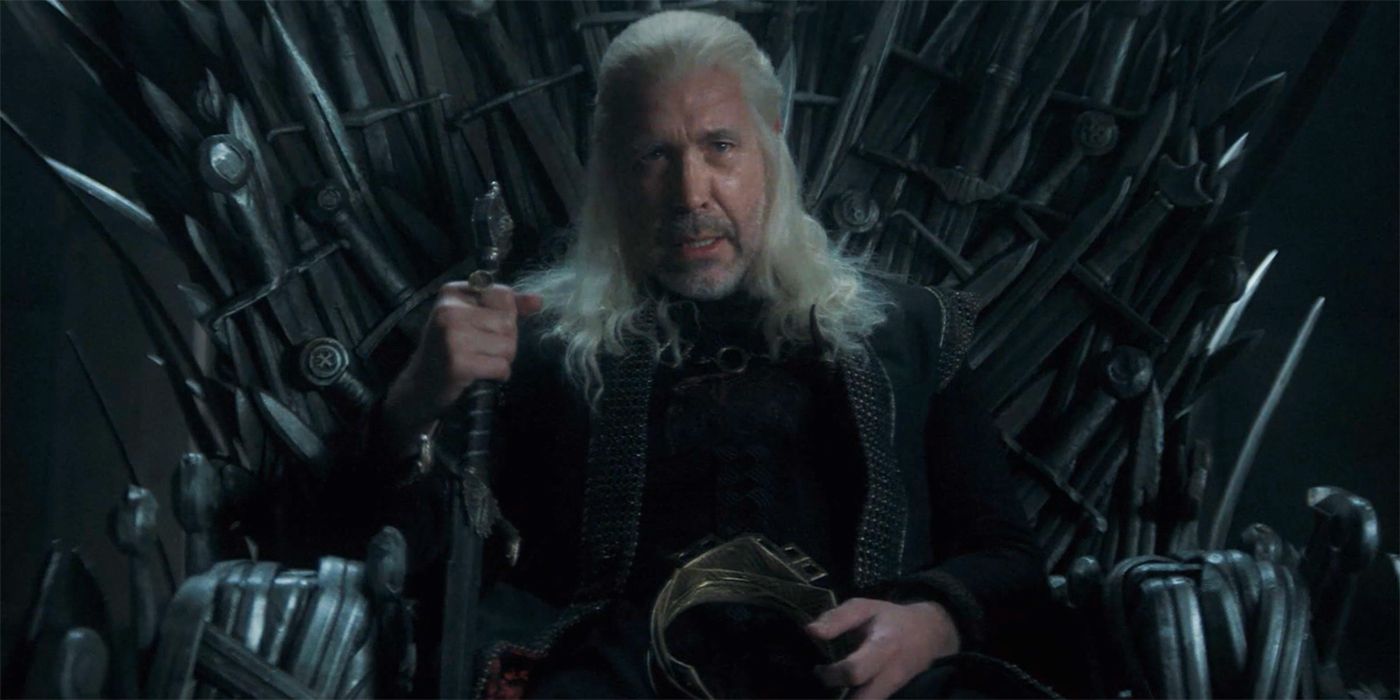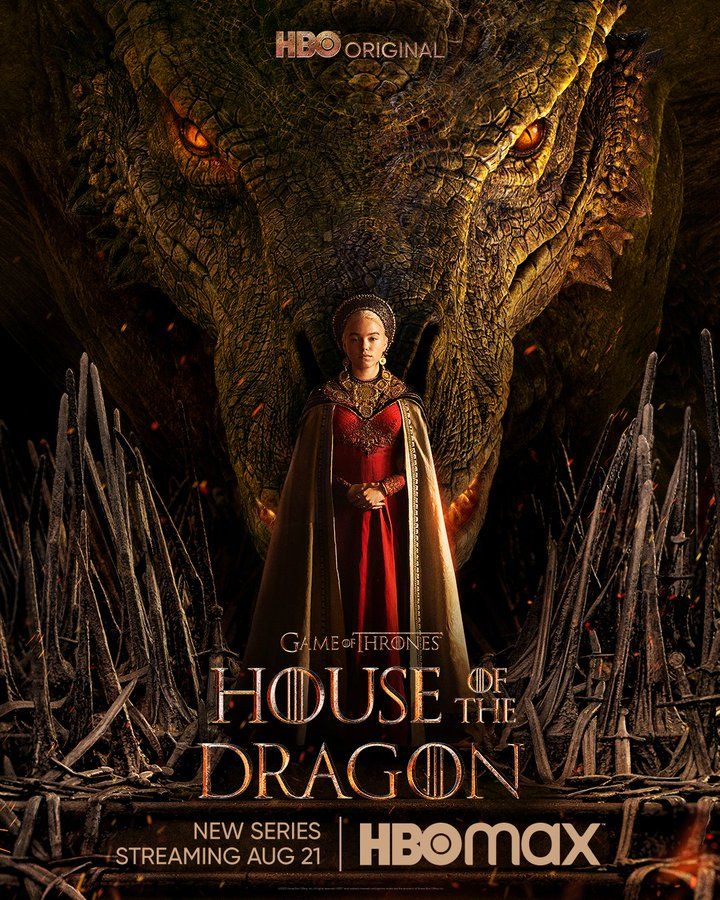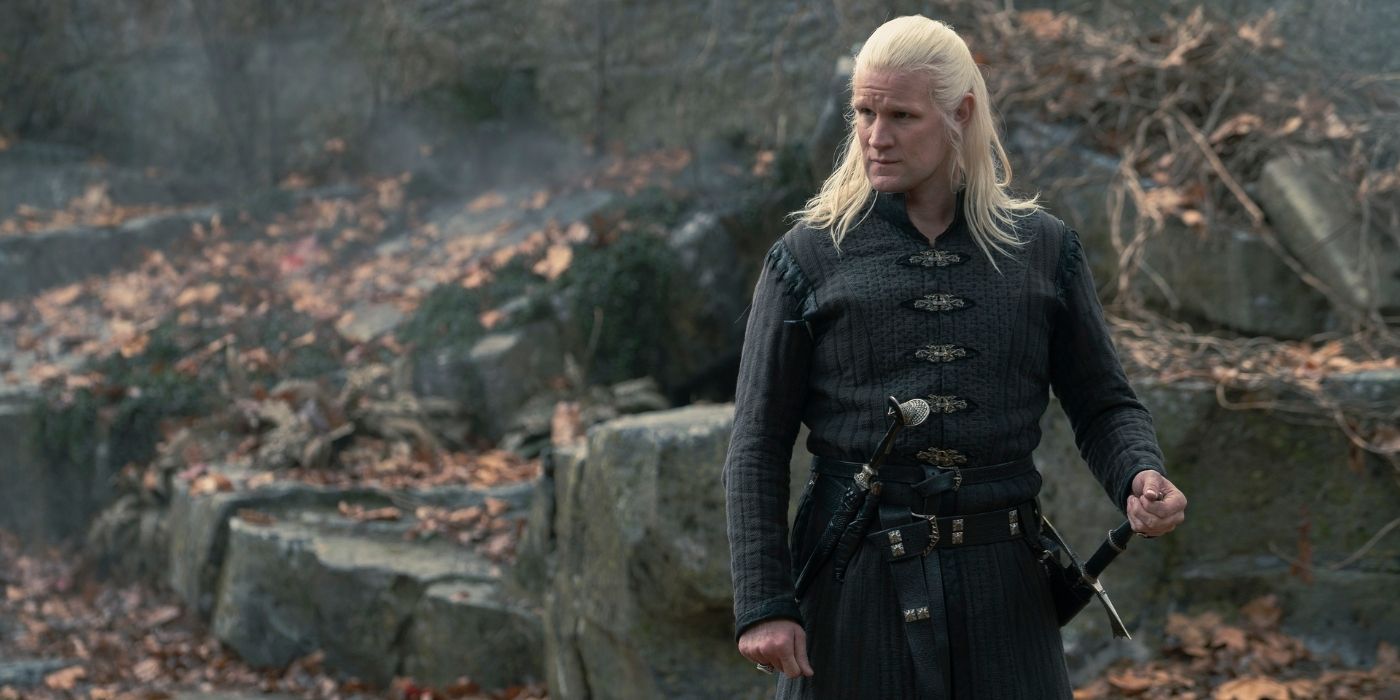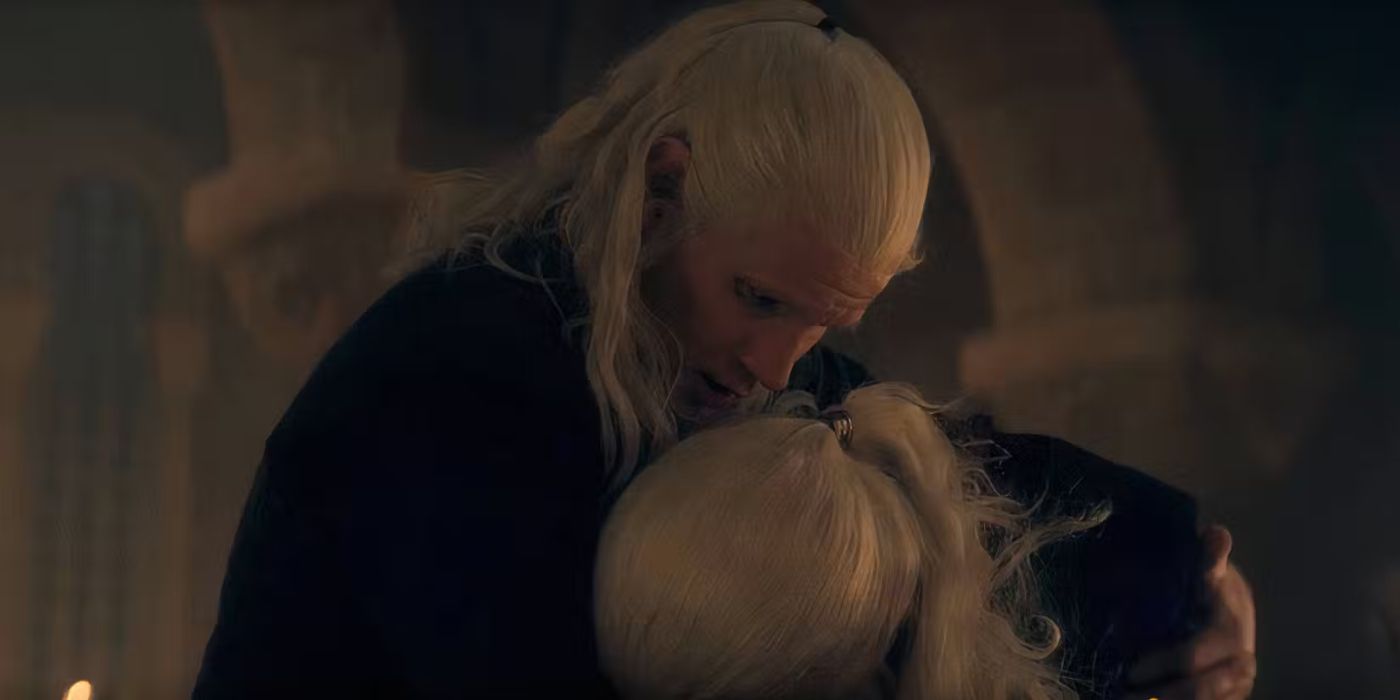Editor’s note: The below contains spoilers for House of the Dragon Season 2, Episode 6.
The Big Picture
- Daemon Targaryen’s arc in
House of the Dragon
Season 2 delves into his complex and contradictory psyche. - Daemon’s visions force him to confront his flaws, especially his hallucinations of Viserys in Episode 6.
- Daemon’s emotional vulnerability is surprising and makes him a more engaging character.
Few House of the Dragon characters have proven more mercurial, and therefore as fascinating and divisive, than Daemon Targaryen (Matt Smith). Does the Rogue Prince truly crave the Iron Throne, or does his familial devotion overrule his self-serving urges? Does Daemon even know what he wants underneath his misdirected anger and bristling pride? His time at Harrenhal during Dragon‘s sophomore season seems designed to answer these questions, or at least put his psyche through the wringer enough to catch a finer glimpse at why George R. R. Martin named Daemon his favorite Targaryen. Although it’s fair to question if Daemon’s unsettling visions need to span half the season and whether every scenario has been effective, his Gothic nightmares are systematically breaking down his lifelong contradictions and untangling his messy desires. Episode 6 might offer this arc’s coup de grâce: Daemon hallucinates his late brother, Viserys Targaryen (Paddy Considine). The result is a Rogue Prince we’ve never seen before, a man not just reckoning with his many sins, but emotionally defenseless — and a more enjoyable character.
Daemon Targaryen Is More Interesting When He’s Vulnerable
Any “Daemon Targaryen Season 1 highlight reel” worth its salt includes his one-man army siege on the Crabfeeder and his steady supply of snarling comebacks. His most impressive moments in House of the Dragon‘s debut season aren’t the flashiest ones, however, but the blink-and-you’ll-miss times when softer emotions creep through his dragon-hide shell. Take his unspoken grief over the death of his wife Laena Velaryon (Nanna Blondell), his subdued sensitivity toward a pregnant Rhaenyra (Emma D’Arcy), and when he replaces Viserys’ crown after it topples off the king’s head — a gesture demonstrating delicate consideration for his brother’s dignity, not a grab for the Iron Throne. Those rare beats, coupled with Smith’s intuitive performance style, suggest a depth beyond the stereotypical second son daydreaming about usurpation.
Despite bending the knee to Rhaenyra last season, Season 2 has put Daemon’s loyalties in doubt. Never the world’s steadiest character, his estrangement from Rhaenyra, the fallout of Blood and Cheese, and a steady diet of Harrenhal visions leave Daemon psychologically unmoored. By Episode 5, he declares his plans to seize King’s Landing for himself. Although disappointing and regressive after Season 1, if one studies Daemon just through his broad strokes, betraying his wife is an archetypal move. There’s a reason he’s called the Rogue Prince; Daemon might be a blunt instrument, but an unpredictable blade inflicts damage. You never want him as your enemy, but you shouldn’t trust him, even though Smith’s brazenly smirking presence could probably have chemistry (however unsettling) with a wooden board.
Episode 6 resets Daemon’s balance through some much-needed moments of wrenching delicacy. The same gleeful agent of chaos who once publicly beheaded a man becomes more engaging, refreshing, and accessible. Violence and braggadocio are Daemon’s default, so he’s been restless for a fight since Viserys’ death — and constantly denied that outlet. He fails to assassinate Aemond Targaryen (Ewan Mitchell), loses Rhaenyra’s trust, and conquering Harrenhal is the opposite of a glorious bloodbath. He threatens to burn House Bracken into submission? They walk away. He postures Targaryen exceptionalism? The Riverlords rebel.
‘House of the Dragon’ Season 2 Forces Daemon To Face His Flaws
Pacing and content critiques aside, Daemon’s A Christmas Carol arc traps him on his back foot. His worst mistakes and insecurities haunt him in the form of the people he’s loved and lost. And no matter how often he keeps failing, a character as stubborn as Daemon won’t confront his flaws unless he’s forced to. Season 2 mercilessly upsets the status quo; he can’t fight the past with a sword or a dragon. Only once his psychologically battered defenses hit their lowest can the sight of Viserys produce a Daemon who acts contrite, not combative. Unlike his previous visions, Daemon relives the past, specifically the moment Viserys named Rhaenyra his heir and stripped Daemon of his de facto inheritance. Daemon has no one to blame for this fate except his own blithe cruelty, and the brothers’ fractured relationship all comes back to when Daemon fed his ego instead of supporting his grief-stricken brother.
Many years and traumas later, Daemon acts defeated and shamed under Viserys’ rage. He fidgets his fingers and flinches, interjects a quietly hopeless “don’t” that can’t rewrite time. He almost cries when Viserys crumples, hands reaching to comfort him before choosing his typical escape — hurrying for the doors. Daemon might want to tend to his loved ones, but doing so demands confronting dire truths and accepting accountability. Ironically, if Daemon just ponied up, then he’d reap the reward that he craves: validation. Instead, he acts out for attention and loses his family as routinely as clockwork.

Related
Paddy Considine Shares an Amusing Reunion with Matt Smith in New ‘House of the Dragon’ BTS Images
King Viserys returns one last time in the latest episode.
This vision doesn’t let him take the coward’s way out. The throne room door stays locked no matter how much he shouts, demands, or panics. Eventually, he slumps against the door and softly begs for freedom. Being eternally trapped in this shameful moment would be one of Daemon’s many versions of hell. And although Daemon looks over his shoulder when he hears Viserys’ crown fall, he doesn’t try to claim it. If Daemon wants the Iron Throne above all else, then temptation should prevail when he’s at his wits’ end: possibly poisoned, probably sleep-deprived, and definitely paranoid.
Daemon Choosing His Family Over the Throne Sets Him Apart
Finding no solutions, he bolts from Harrenhal. Just like the throne room, however, Alys Rivers (Gayle Rankin) — the likeliest culprit behind his unraveling — won’t spare him so easily or cower to his dramatics. Alys diagnoses Daemon’s main character syndrome and recontextualizes his relationship to the throne. He isn’t suited to the crown, nor is he this tale’s hero or villain. It’s telling that Alys’ brutal insight pierces through Daemon’s emotional amor only in the wake of having the walking wound that is Viserys reopened. Near tears, voice bruised and fragile, Daemon finally drops his guard and asks for help — an unheard act.
Admitting his weakness transcends politics. Daemon acknowledges, albeit indirectly, how his lifelong reactionary instincts have all but ruined Rhaenyra’s campaign and their marriage. This almost arrested development cycle of his ambition, impulsiveness, fear, immaturity, and responsibility-avoidance costs his family time and again, and costs him his family by poisoning his few altruistic relationships. It also begs the question of the hour: does Daemon really want the throne because he’s as damaged as Aemond, or did he flee Dragonstone because Rhaenyra reiterated the same things Viserys said two decades earlier: that Daemon’s family can’t trust him?
Daemon Can’t Move Forward Unless He Looks Back
After that snippet of growth, Episode 6 culminates with Daemon symbolically atoning for a key sin. Tenderly cradling Viserys as his older brother sobs over the bodies of his wife and newborn son, Daemon owns the pain he’s inflicted and stares down his guilt and grief. When Ser Simon Strong (Simon Russell Beale) startles Daemon awake, he seems to rock his favorite devilish grin at the news of Lord Tully’s “death.” The moment Strong leaves, Daemon’s strained grimace shatters into the gasping tears he’d barely withheld. A plan has finally gone well — and Daemon’s second chance at closure is severed. He’ll never again see Viserys, the brother this war hasn’t allowed him time to mourn. Daemon excuses and ignores these emotions by keeping them bottled too deep to grapple with, and they’re as true to his character as his worst tendencies.
Since the first season diluted Daemon’s dimensionality by cutting his softer scenes, the production’s editing choices are partially why his newfound openness is appealing. A Westerosi man can only show his thin-skinned emotions through violence. Daemon humbling himself doesn’t fix the past or guarantee the future, yet it’s unlikely his baby steps exist in a vacuum. Episode 6 all but confirms that Daemon and Aemond are foils, not direct parallels. If Aemond seethes his way toward fratricide, then Daemon retroactively comforts the brother, his foolish insecurities pushed away — and nothing except Viserys could have unlocked Daemon’s evolution. Even if Daemon’s efforts could be too little, too late for Rhaenyra, a broken, gentle, and self-aware Daemon is the more engaging and satisfying choice, especially since Smith’s vividly trepidatious performance reminds viewers why his vulnerability wins back empathetic engagement in spades.
New episodes of House of the Dragon Season 2 premiere Sundays on HBO and Max.
Source link




